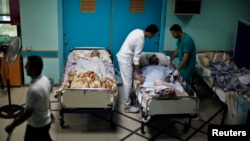Basman Alashi, the director of the al-Wafa Rehabilitation Center in Gaza, said he received a call at 8:45 pm last Thursday with a warning: leave the building, an assault will begin in ten minutes.
The call was from the Israel Defense Forces [IDF]. The military is known to inform residents of buildings being targeted during operations – in this case a campaign known as Protective Edge that is seeking to destroy the military capabilities of the Hamas Palestinian group that controls the Gaza Strip.
Alashi says he and his staff initially refused to evacuate.
"I told them I cannot leave," he said. "I have people who are paralyzed, unconscious, they produce no threat to the Israelis at all, they're just sitting in their beds."
Heavy shelling
But just 10 minutes later, the barrage started. Heavy shelling came from the east, hitting a side of the building just hundreds of meters from the Israeli border. The power went out, the nurses were too afraid to stay, and Alashi scrambled to get 17 ambulances to move the remaining patients to another medical facility in central Gaza.
The patients still left at al-Wafa on that day were the ones who could not fend for themselves. Most were unconscious, hooked up to feeding tubes and catheters, paralyzed by stroke, cancer, spinal injuries and accidents.
On a visit to the facility earlier in the week, VOA saw them lined up in hospital beds on the first floor. They had been relocated after previous Israeli strikes caused damage to the building.
Among them was a 12-year old boy who lay perfectly still on his back, unconscious for 60 days, since drowning in his own pool. Alashi says he spent 15 minutes underwater.
In a statement issued after Thursday's strike, an IDF spokesman, Captain Eytan Buchman, put the blame on Hamas for launching rockets in the vicinity of the building.
He said after warning the al-Wafa center, the military was "left with no choice" but to "target the launcher with the most precise munition capable of ensuring its destruction."
Alashi denied any militant activities take place at the center.
"We have been at your border for the last 15 years," he said. "We haven't had any incidents of having anybody to hurt you. We are just a hospital."
UN assessment
The United Nations says 16 health facilities have been damaged since Israel began operations on July 7 to counter Palestinian rocket fire and other militant activities originating from Gaza. Thirteen additional primary care facilities have been closed for because they are too close to targeted sites.
More than 300 Palestinians have been killed during the campaign of air strikes, naval assaults and ground operations, while more than 2,000 people have been injured.
Many of the wounded come to al-Shifa hospital in Gaza City.
Doctor Mads Gilbert, a Norwegian volunteer, treats some of the most critically wounded patients there.
"This is a typical war injury," he said, examining a middle-aged man, bandaged and bruised in the intensive care unit, his right leg amputated below the knee. "He is, of course, a civilian."
Palestinian doctors and nurses have started working 24 hour shifts, and medical students are lending a hand, while getting on-the-ground training in emergency suturing and CPR.
"Nobody asked me to come and volunteer, I came here on my own," said Basel Abu Warda, a first year intern volunteering at Shifa. "I tried to do what every man or every person would do, to help."
Overwhelming needs
Warda said most of the wounded he sees at the hospital need emergency treatment. "I don't see simple injuries. Most of them are losing some limbs or have severe bleeding, severe burns, et cetera," he said.
But Shifa is overwhelmed. With supplies of electricity and gasoline tentative during times of peace and erratic during times of war, hospital staff are worried they will not be able to maintain the level of care.
Gilbert said the hospital is also lacking disposable items, medicine and is operating with outdated equipment.
He blamed the Israeli blockade of Gaza for choking off medical supply lines.
"One of the problems in Gaza is that the abnormal becomes normal," he said. "Over the last seven years with the brutal siege of Gaza, the world has come to accept it as normality."
The Israeli government says it is facilitating the daily transfer of truckloads of medical supplies and other essentials into Gaza, despite the conflict.
Alashi, of the al-Wafa Rehabilitation Center, said he hopes a ceasefire will be reached soon between Israel and Hamas so that he can start thinking about the future and whether to rebuild the hospital.
Many of his patients will not remember the missile strikes and the evacuation. But he worries about those who are alert and are now shaking, unable to sleep, traumatized.
"They still have a vision of bombing and screaming and sense the smoke of it, the heat of it," he said. "It is going to take time for that vision to disappear."





